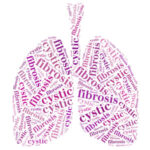 Puberty
Puberty
Puberty is the name for the time when your body begins to change and you go from being a child to an adult. Your hormone levels will change and you will develop breasts, grow taller, and start your menstrual periods. Puberty in girls usually starts between 8 and 13 years of age. Girls who have cystic fibrosis (CF) may start puberty later than girls who do not have CF. In fact, research shows that girls who have CF and live in the United States (US) begin breast development and get their first menstrual period about 6 months later on average.
Physical changes: Girls with CF go through all the same changes that happen to all girls during puberty. Breast development is often the first sign that puberty has begun. You will also start to grow hair around your pubic area and under your arms. Your skin may be more active during puberty, which can cause acne and body odor. Your bones will become stronger and double in density (thickness and strength).
Growth spurt: Most girls have a growth spurt the year before they have their first menstrual period. In addition to getting taller, your hips will get wider.
Vaginal discharge: Most girls notice vaginal discharge, or a thin yellow or white stain on their underpants, as they go through puberty. This is a normal fluid that helps clean and moisten your vagina. Some girls with CF have said that their vaginal discharge is thicker and can be affected by their CF medicines. These changes are normal. However, itching, burning, irritation around your vagina and/or a new discharge (often thick & white) could mean that you have a yeast infection, especially if you are on antibiotics for your CF. If you have one or more of these symptoms, talk to your CF provider as soon as possible.
Nutrition and having a healthy body weight is very important during puberty. Getting enough calories is important for breast development, growing taller, making strong bones, and getting regular menstrual periods. A lot of girls get their first period when they weigh at least 100 pounds. Nutrition is also very important for your CF health. It’s especially important to continue to eat a high-calorie, high-fat diet, take vitamins, and exercise to manage your CF and stay healthy during puberty. Feeling good about yourself and having a good body image is important for all girls.
Menstrual Periods
- Most girls get their first period about 2 – 2 ½ years after they begin to develop breasts. The average age that girls have their first period is between 12-13 years old, but some girls start as early as age 9, and others as late as 15. Girls with CF may be slightly older when they get their first period. On average, American girls with CF report getting their period about 6 months later than girls without CF. However, if you are very ill or underweight, your first period may be delayed longer.
- It can take a couple of years for periods to become regular (with or without CF). Most girls find that their menstrual cycles last anywhere from 21-35 days (counting from the first day of your period to the first day of your next period) and bleeding can last from 3 to 7 days. The amount of blood flow will likely be different each day. Typically, you will have heavier bleeding in the beginning of your period and a lighter flow towards the end. If you have CF, your periods and cycles can change when you are sick.
- It’s a good idea to use a calendar or a phone app to keep track of when your periods start and stop. If your periods are irregular, you can share this information with both your CF provider and primary care provider (PCP).
- If you are 15 or older and haven’t had your first period yet or it’s been 3 or more years since you started your breast development, tell your CF provider or your primary care provider who can check that you are on track.
About 25% of people with CF notice worsening of their CF symptoms during their period. This may be due to changes in the hormone levels that your body makes during puberty. You may cough more, have more sputum, or have other signs of an exacerbation of your CF. It is especially important to do all your CF treatments and airway clearance during this time of your cycle. If you notice that your CF symptoms get worse with your periods, talk with your CF provider. Some girls have found that starting a type of birth control that regulates your menstrual cycle (and hormone levels) is helpful with controlling these symptoms.
Our health guides are developed through a systematic, rigorous process to ensure accuracy, reliability, and trustworthiness. Written and reviewed by experienced healthcare clinicians from Boston Children's Hospital, a Harvard Medical School teaching hospital and consistently ranked as a top hospital by Newsweek and U.S. News & World Report, these guides combine clinical expertise, specialized knowledge, and evidence-based medicine. We also incorporate research and best practices from authoritative sources such as the CDC, NIH, PubMed, top medical journals, and UpToDate.com. Clinical specialists and subject matter experts review and edit each guide, reinforcing our commitment to high-quality, factual, scientifically accurate health information for young people.